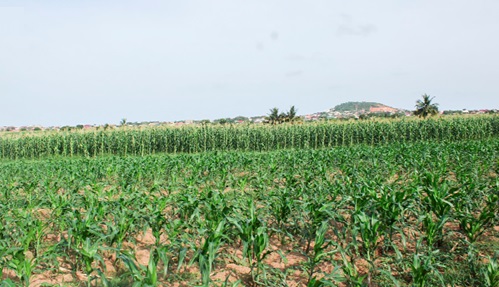
Weija Irrigation Project, a model for sustainable vegetable farming
Many have relegated farming opportunities to other regions other than the Greater-Accra Region, the capital of Ghana.
Rightly so, as this region cannot boast of the largest scale of farming, especially in the main cities of the capital, it certainly can boast of one of the most consistent farming areas in Weija Irrigation Farms with an all-year-round farming in the country.
Weija Irrigation Farms
The Weija Irrigation Farms was established in 1983 by the Ghana Irrigation Development Authority (GIDA) under the auspices of the Ministry of Food and Agriculture (MoFA) to help in the cultivation of crops to ensure food security.
With more than 180.2 hectares of irrigable land out of the 220 hectares of farmland, the Weija Irrigation Farms has more than 300 farmers who are into the cultivation of vegetables such as tomatoes, carrots, onion, okra, pepper among others as well as maize, and tubers such as cassava, and sweet potatoes for the local and export markets.
It is also the hub for the cultivation of Asian vegetables including "turia, chillis, marrows, onions, cabbage" among others which are largely exported to the Asian market. The scheme produces annually a total of 10.14 tonnes per hectare of vegetables such as okra, pepper, tinda, cucumber, tomatoes, onions, sweet potato and maize.
Cropping all the irrigable land translates to 2,271.36 tonnes of vegetables annually. The beneficiary communities are Tuba, Kokrobitey, Kasoa, Bortianor and other adjoining communities.
Replication
The scheme proves a good example that could be replicated across the country in areas that are viable for the cultivation of some of the most imported vegetables. This would help reduce importation and strengthen the sector.
In 2019, the Agency for Health and Food Security (AHEFS), a non-governmental organisation (NGO) revealed that Ghana spends over US$100 million on the importation of vegetables annually.
This, therefore, explains that more investments need to be made into the sector to increase the production capacity of vegetables in the country. The Weija Irrigation Project sits as a good example or model for the cultivation of vegetables across the country.
Despite its challenges, it has proven to be a very sustainable project which has been managed by GIDA in collaboration with the farmers who have been handling, protecting and maintaining the facility.
To protect the canal and the farms, the farmers have established among themselves a task force, that ensures that the canal and the reservoirs are protected from encroachers.
Residents, who have over the years tampered with the canals, are arrested by this task force and handed over to the police for the law to take action.
Farmers experience
A farmer and exporter of vegetables, Musah Sodji, told the Daily Graphic that farming had been their source of livelihood for a very long time as some of them inherited the farms from their parents.
He indicated that the farms, which started in 1983, demystified the assertion that the Greater-Accra Region did not hold enough potential in farming, adding that the Weija irrigation farms were the most consistent and worked all-year-round.
Mr Sodji added that he had been cultivating and importing vegetables for more than five years which was very profitable for agribusiness. He urged the youth to embrace farming as it offered a lot of opportunities and also contributed significantly to the growth of the economy.
For him, although there were vast lands for farming in the area, unfortunately, the young people in the area had failed to see them as opportunities for growth and left them for persons who were already well-to-do to chance on them.
Challenges
On some challenges confronting the Weija Irrigation Farms, the Vice Chairman of Weija Irrigation Farmers Association, James Amankwah Mensah, told the Daily Graphic in an interview said the 7.4-kilometre open canal which used to pump water from the River Densu needed to be taken a look at as some encroachers had made the canal their major source of water supply.
Again, he said residents living close to the canal were in the habit of throwing filth into the canal, while others were stationed vehicles near the canal to fetch the water supplied by the pumping station into the reservoir for irrigation purposes.
Mr Mensah added that the current state of the canal had made heavy downpours a threat to its maintenance as soil erosion caused by rains was channelled into the canal. That, according to him, averagely cost the farmers GH¢15,000.00 to dredge any time the canal was choked with filth and debris.
He also noted that pumping water from the River Densu into the reservoirs was costly as it used electricity, and added that the farmers paid as high as GH¢ 10,000.00 to pump water into the reservoir, while residents were feeding off their sweat by fetching from the canal, making it expensive.
He appealed to GIDA and the government to cover the canal or replace it with a pipeline as it was their most pressing challenge in the all-year-round farming.
